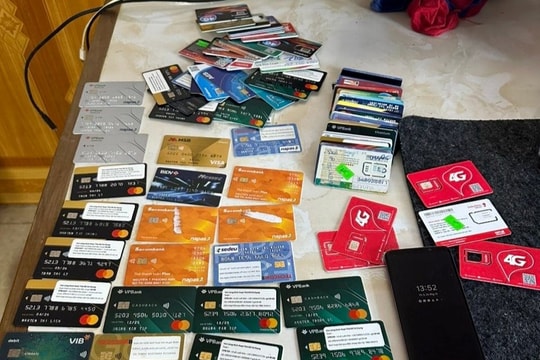Online fraud is on the rise
Along with the development of information technology, online sales, and cashless payments, the situation of criminals taking advantage of cyberspace and using high technology to defraud and appropriate property is becoming more complicated.
Bank staff detect fraud
For two consecutive days, thanks to their vigilance and experience, Agribank Tay Nghe An branch staff have helped customers avoid online scams.
Ms. Tran Thi Thuy - Head of Accounting - Treasury Team, Cho Moi Transaction Office, Agribank Tay Nghe An Branch said that at about 3:20 p.m. on October 15, at Cho Moi Transaction Office, NTO customer residing in Hamlet 4, Nghia Thuan Commune, Thai Hoa Town came with her husband to withdraw money from the savings book to transfer 90 million VND into the account for her daughter.
During the operation, the teller noticed some abnormalities so he investigated further and learned that the customer wanted to transfer money to some accounts in Soc Trang province, while his daughter was studying and working in Japan. The teller quickly stopped the savings book withdrawal transaction, persuading the customer to call back to confirm the account number of a relative to check whether his daughter's social network account had been hijacked or not?
After re-verification, it was discovered that the customer's daughter's Facebook account had been hijacked by a criminal, who lured Ms. O into depositing money into another account.

The very next morning, October 16, Ms. Dao Thi H., a resident of Dong Hieu commune, Thai Hoa town, and her husband came to the transaction with the hope of mortgaging the land use rights to borrow 200 million VND. Realizing that the customer was showing signs of fear and confusion, the transaction officer invited the customer to the 2nd floor for further discussion and at the same time reported to the superiors.
Analyze recent popular cyber fraud cases for customers. After being talked to and confided by the transaction officer, the customer realized that he was being scammed by a scammer. The trick they used was to threaten the customer that he was involved in a criminal network, was being handled by the Thai Hoa Town Police, and needed to transfer money to cooperate with the investigation or he would be detained.
It is known that the customer received a call from subscriber 0332303262 claiming to be Thai Hoa Town Police informing her that Ms. H.'s husband was involved in a drug trafficking ring. The subjects contacted her using many different phone numbers, continuously pressuring Ms. H. to transfer money and threatening her not to report to relatives or bank staff.
Impersonating police to appropriate property
“My family has just been manipulated by scammers. They chose elderly people to commit their crimes.” This is what Ms. P, from Vinh city, posted on Facebook, recounting the story of her relative being scammed by a scammer posing as a police officer.
Ms. P said: First, they called and asked why you didn't go to the ward police station to integrate the social insurance software into your personal identification account. They impersonated a police officer in the ward named Son, then they transferred the phone to another person impersonating a city police officer named Hai. After that, they told you to leave it there so we can do it for you, you don't have to go to the city police station anymore.
After gaining the victim’s trust, he said there was a complaint with his personal information, accusing him of participating in a money laundering and drug trafficking ring. Did he lose his ID card or reveal his bank account to anyone?
After the victim starts to mumble, they will say: "I know you have been deceived and taken advantage of, but we are carrying out a large international and national project. Now we will help you clear your name in this case, under the condition of utmost secrecy, not revealing this to anyone, especially relatives and children. If you do not cooperate, it will greatly affect the reputation and honor of your children, because you are old, so it is okay, but your children will be affected. If you agree, we will help you prove that you have enough financial means to not participate in money laundering, by transferring 200 million VND to this account. After 2 days, we will complete the case file and return it to you intact."
This scam trick makes the elderly believe that they will not lose money so they are willing to pay. If the victim has money in their bank account and makes the payment on the app, the money will be transferred immediately to the scammers.
If the victim does not have a banking app, they will guide them on how to deposit cash. On weekdays, the scammers will guide the victim to go to the bank to deposit cash with the excuse of sending it to their children or grandchildren. Later, when the bank staff is alert, discovers and coordinates with the police to prevent some cases, the subjects ask to deposit money immediately on holidays, when the bank is not open, they will guide the victim to go to the gold shop to transfer money.
In case the victim does not have enough money to pay, they will guide them on how to borrow money easily and hide information easily. After paying all the money requested by the scammers, if not yet exposed, they will make up a situation to get the victim to pay more, if not paying more, they will lose the amount paid. And so the victim just spends all their money, assets that can be converted into money to pay...
In my case, the scammers said that they had to hide it from their children and grandchildren first, and borrow money under the pretext of building a church, buying a car... My family was lucky, the neighbors saw the elderly borrowing money and called me, so we were able to stop them in time! So, everyone should be careful when receiving strange phone calls threatening them, asking them to pay money, asking them to install strange apps. And if you see someone suddenly borrowing money, especially the elderly, you should carefully check the information, lest you become an indirect victim of fraud!
Ms. P. warned
Fraud is on the rise
Currently, in Nghe An, there is also a growing trend of impersonating shippers to call customers to inform them of online orders and request payment to appropriate their property. Ms. H in Ha Huy Tap ward (Vinh city) said that she often orders online, and usually only transfers money after receiving the goods (COD). One day, when she was away, she received a call asking her to transfer 350,000 VND for the goods. Because she had ordered quite a lot and did not know which goods, she transferred the money. When she got home and could not find the goods, she called the number she had contacted, but the other end of the line was locked...
Scams are flourishing, in all kinds, many cases cost billions but there are also cases of only a few tens of thousands of dong. Those are calls saying that you have goods worth 0 dong, just need to transfer a few tens of thousands of dong for shipping...

Recently, there has been another form of fraud, that is, many people who have closed a purchase order, are sent fraudulent messages via Zalo, asking customers to transfer money, the bank account is also made in the seller's name. Many people have to constantly remind customers that closing messages on Zalo are fraudulent, people do not transfer money!
Ms. NH, a fashion retailer, said that recently her account was impersonated. To avoid being scammed, she had to post on Facebook to notify customers not to transfer money in advance via Zalo account. “To avoid scammers, customers should not transfer money in advance to anyone. I will deliver the goods and then pay. I do not close orders or pay via Zalo,” Ms. NH posted.
In addition, currently, through malware installed on the victim's mobile device, scammers can monitor every move of the user, including password authentication to secure bank accounts and securities accounts, thereby stealing money.

It is known that the Ministry of Public Security has listed 24 forms of online fraud, from the most sophisticated forms such as fraud using deepfake videos (fake, false images and information), to impersonating police agencies, prosecutors, courts, and tax officials to call via internet protocol to threaten victims, then appropriating personal information and property.
Experts say that online scams are becoming more and more sophisticated, making it difficult for many people to recognize. Therefore, people need to be vigilant and find ways to verify the information of any subject who actively contacts and claims to be a police officer, bank employee, etc. Do not install or download any application directly from a link sent by anyone via SMS, chat content on social platforms, messaging applications; or from websites provided by the subjects. Do not trust and follow or contact advertising subjects on social networks such as Facebook, Zalo, Viber, Telegram, etc.



.jpg)


